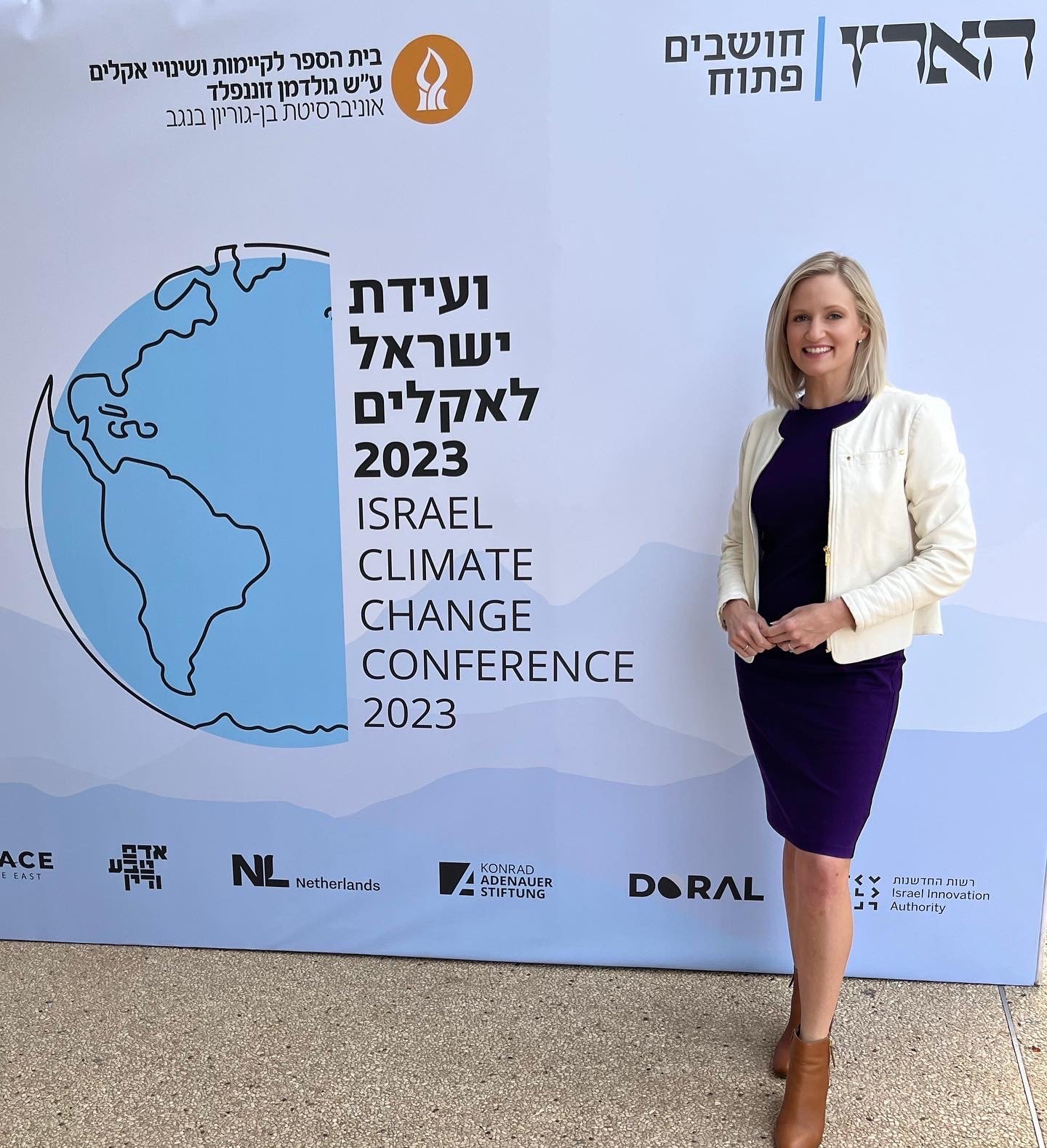JFP-funded Reporter Liz McLaughlin Reflects on Visiting Israel - A Climate Hot Spot and Solutions Incubator
Posting: Monday, April 3, 2023
“Shame on you!,” the crowd belted in unison, overtaking the maximum volume of the sound system at Ben-Gurion University, 45 miles south of Jerusalem. The tension was mounting at the Haaretz Climate Conference, where Israel’s president Isaac Herzog and NASA scientists were among the featured speakers. But it was Idit Silman, Israel’s Minister of Environmental Protection and infamous side-switcher in the country’s last regime change, who incited the crowd’s protest.
“Shame!!,” the crowd shouted repeatedly, muffling pleas from event hosts to quiet down. As security guards ripped away protestors’ signs, more attendees joined the chorus of chants. Eventually, Silman was forced off the stage and swiftly exited the building.
I rushed out behind her, the only person to catch her for a response. Clearly frustrated, Silman called the demonstration “hypocritical” and said this kind of disruption is keeping her from doing her job.
I’d been in Israel less than 48 hours, landing in Jerusalem during one of the nation’s biggest protests just one day earlier. It was mid-February when more than half a million demonstrators took to the streets, blocking trains, stopping traffic, and calling the far-right government’s proposal for judicial reform “the end of democracy.”
Irit Porat, one of the activists leading the protest at the climate conference, says the proposed reforms would also pull the rug out from under environmental protections and climate change policy in the country. “The power of law will go to the biggest bidder, the financial interests with the deepest pockets,” Porat said. “I don’t trust the government to protect us, and it doesn’t seem like Silman wants to go against the corrupt coalition that she’s a part of.”
Credit: LIZ MCLAUGHLIN / WRAL
I was in Israel as one of eight international climate journalists chosen for a program coordinated by the Jerusalem Press Club, representing WRAL, an NBC affiliate in Raleigh, North Carolina. The delegation also included reporters from NPR and Huffington Post joining forces for a week of immersive exploration of climate issues in the Middle East.
As the human population and global temperatures grow at unmanageable rates, the world’s problem-solvers are tasked with coming up with solutions…and fast.
Enter Israel: The Silicon Valley for climate tech, with nearly 900 startups in the sector that raised more than $1.5 billion in just the past year.
I was able to see the work of dozens of those companies with an aggressive schedule of meetings that culminated at the OurCrowd Global Investor Summit – a showcase of startups that one might compare to the Consumer Electronics Show in Las Vegas.
“We’re not making progress fast enough,” OurCrowd CEO Jon Medved said. “We need new technologies, and we need to figure out how to unlock trillions of dollars to accelerate climate-focused companies.”
Israel tends to be better at innovating and exporting than implementing on its own soil, but startups there are ready to change the world whether it’s by planting trees with drones or unlocking the secrets to affordable green hydrogen.
I met with Anil Soni, CEO of the World Health Organization Foundation, who said there is a simple reason that WHO has a presence at the summit and is so supportive of climate tech: “Climate change is now the greatest threat to human health,” he said.
Ag tech was one of the biggest categories, with innovation around feeding the world in a climate that continuously threatens the crops and livestock that sustain us. Israel is uniquely suited for the task after overcoming its own challenges to survive a barren habitat.
Credit: LIZ MCLAUGHLIN / WRAL
“We made the desert bloom,” Medved said. “Israeli agriculture is the pride of the world and now driving a whole new era of agricultural innovation.” Israel already recycles about 85% of its water, compared with 3% in the U.S., technology that will soon be utilized in El Paso.
Medved opened the summit by highlighting some of these companies in a high-production presentation that included metaverse avatars and real-life dancing in front of a crowd of nearly 10,000 attendees. But perhaps the biggest “wow factor” of the opening plenary was served on a plate.
Today’s special: a lamb chop of tomorrow that looks, smells, tastes, and IS meat… grown in a lab. As the crowd was picking their jaws up off the floor, I sat down with the brains behind the muscle, Yaakov Nahmias.
“You’re getting the experience of meat without going through animals,” Nahmais said. “By growing only the cells you plan to consume, you save all of the resources, not to mention the ethical issue of killing, while still getting that flavor and protein we all love so much.”
Credit: LIZ MCLAUGHLIN / WRAL
He says the ecological impact of cultured meat is 95% less space, 80% less water, and 98% fewer carbon emissions than traditional methods. “It means we can completely transform the planet around us in the next couple of decades,” he said.
Nahmais is involved in several cultivated meat projects including Believer Meats, an Israeli company breaking ground on what it says will be the largest cultivated meat facility in the world in Wilson, North Carolina just 50 miles from my home.
In search of the perfect pairing for a synthetic steak, I found a superfood growing in an urban warehouse in Tel-Aviv. GreenOnyx CEO Tspi Shoham says its product “Wanna Greens” can fill the phytonutrient gap in most modern diets (8 out of 10 Americans are said to be deficient) with a revolutionary new growing method. The company’s fully autonomous modular farms look more like computer cabinets in a data center than garden equipment and can produce 40 tons of the tiny green water-based lentils a year without the need for land or human intervention and independent of weather conditions. The nutrient-dense food contains more iron than spinach, more zinc than broccoli, and boasts a six-week shelf life. Just a couple of spoonfuls can deliver the nutritional value of six bowls of raw leafy greens, according to GreenOnyx.
That all sounds good on paper, but the biggest surprise was in the palette. The vegetable caviar looked like green miniature cous cous and was somehow equally good on French fries, ice cream, and mixed into hummus. The refreshing but mild taste gave it a barely-there flavor that blends seamlessly with just about anything. The texture was playful and crunchy, and the tiny green balls are small enough to create a spreadable smoothness.
With our minds (and taste buds) blown, we wrapped up the whirlwind week with a meal for the soul.
Credit: LIZ MCLAUGHLIN / WRAL
We welcomed Shabbat, the Jewish day of rest, as the sun set on my final day in Jerusalem. After 13-hour days of hopping around the country and learning about one innovation after another, it was powerful to pause and let the experience sink in with more memories left to be made.
Our media delegation was invited to a traditional Shabbat dinner hosted by arguably Jerusalem’s most interesting couple. Susan Silverman, an American Reform rabbi with her comedian sister Sarah’s quick wit and smile, greeted us warmly and had each of us draw an angel card from a deck. Her husband, Yosef Abramowitz, a solar pioneer and three-time Nobel Peace Prize nominee known as “Captain Sunshine,” gathered us around a long table as we blessed wine, broke bread, and shared our cards with the group. Mine was forgiveness.
In such a tense political climate, with the clock ticking on action needed to prevent catastrophe, it can be easy to get caught up in guilt, fear, and rage. Though the crisis is manmade, it might be time to forgive ourselves and move forward. The card was a gentle reminder that we’re all humans on the same team. I flew home the next day with dozens of new contacts in my phone, more story leads than I could possibly write, and a renewed hope for the future of our planet.
Credit: LIZ MCLAUGHLIN / WRAL
About Liz McLaughlin: She has been a national TV journalist for more than a decade, spending most of that time with the NBC News Channel Specials Unit, where she specialized in enterprise reporting on tech, consumer, feature, medical and environmental stories for nationwide distribution to NBC affiliate stations.
###
Media Contact: Rusty Coats, Executive Director | rusty@jfp-local.org | (813) 277-8959







